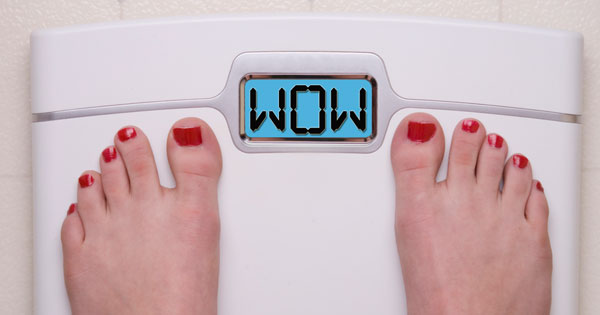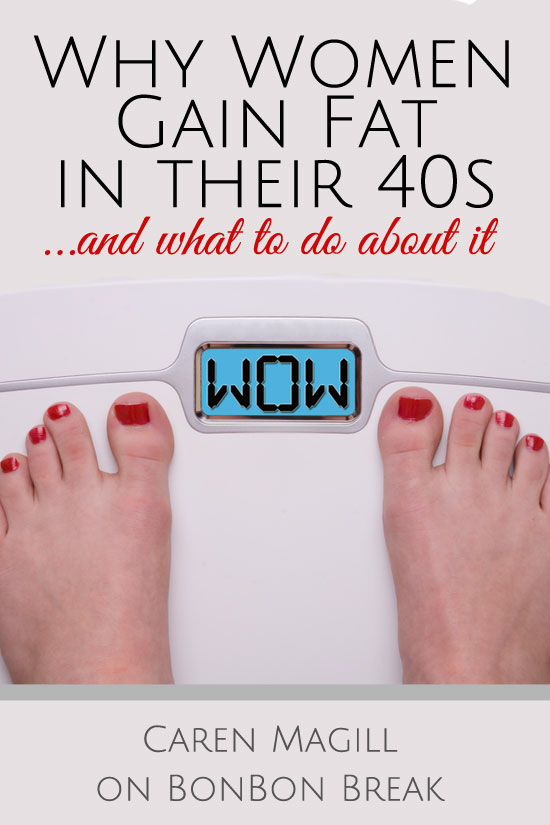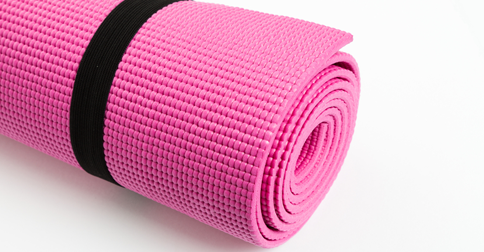Why Women Gain Fat in their 40s

As a 44-year-old, I am all too aware of this process. Not just for myself, but also my girlfriends who are about the same age and happen to be going through the exact same thing.
I generally hear the same comment from all my friends: “This is not my body! I’m not doing anything different then I was 5 years ago, but now I just keep packing on the pounds! What gives?”
It’s hormones my friend. You can go ahead and call this a sweeping generalization, but it appears to be the case that as we age, we can tolerate less and less carbs and processed foods. You may hear this being called insulin resistance, but more specifically, it’s leptin resistance.
Leptin is your “I’m full” hormone. It tells your body to stop storing fat from the food you eat, signaling the brain that you’ve got all the body fat you need, so you’re good. When you’re resistant, your brain doesn’t get those signals from the hormone anymore (even though the fatter you are, the more of it you have), so it encourages you to eat more and store more.
So when people talk about changes in body composition being “hormonal”, this is what they mean. Leptin is being ignored by the brain and therefore, your body continues to believe it’s starving, even when that’s far from truth.
How do you know your leptin resistant? If you find your gaining fat, particularly around the waist, then you probably are. If you see yourself heading in that direction, like my 40-something friends and I, then you are probably on the path.
What causes leptin resistance?
Mostly inflammation based on a diet of highly processed foods, or foods that you have sensitivities too. This is why I think it’s so important to stay away from most grains and gluten! Most of us aren’t celiac, but we’re also not aware that gluten causes chronic low-grade inflammation in the body, which leads to hormone imbalances like the one we’re talking about here.
Sleep is also a huge factor, as I’ve written about before. When you lack sleep, your leptin levels go up and you end up feeling hungry all day and craving carbs. This is very much the case for me, which is why I sleep like it’s my full time job.
So how to rebalance your leptin hormone?
- Avoid processed foods! Stay away from wheat products and gluten for sure. I encourage you to take that one step further and cut out all grains from your diet for a few weeks and see how you feel. A while back, I wrote about how I cut out oatmeal for weeks, then my first day I had it again, it made me tired and spaced out afterward. My body + grains = no-likey. The only way you’ll know if this is true for you, is to try to cut it out for yourself.
- Sleep. I know you’re busy. I am too. You still need 7 to 8 hours MINIMUM. If you can’t do this, you’re not going to win the battle, so start here.
- Eat less carbs, more protein and more healthy fats. Eating more protein will lower leptin while reducing carbs will lower high levels of triglycerides. I would also suggest that you increase healthy fats in place of carbs. Avocado and nut butters are your friend!
- Manage stress. Easier said than done I know, but this is a point in life where women really start to feel the pressure of responsibility and without proper self-care and an outlet (other than wine) to release stress, your elevated cortisol levels will result in extra padding, particularly around the waist. Yoga is a great way to combat this, both as a mental release, but also because all the bending and twisting is great for your adrenals.
Want to learn more about this? Check out Authority Nutrition’s article on Leptin for a great round up of research-based evidence.
READ MORE IN THE BEDROOM
PIN THIS FOR LATER:

This article was syndicated with permission to BonBon Break Media LLC.








